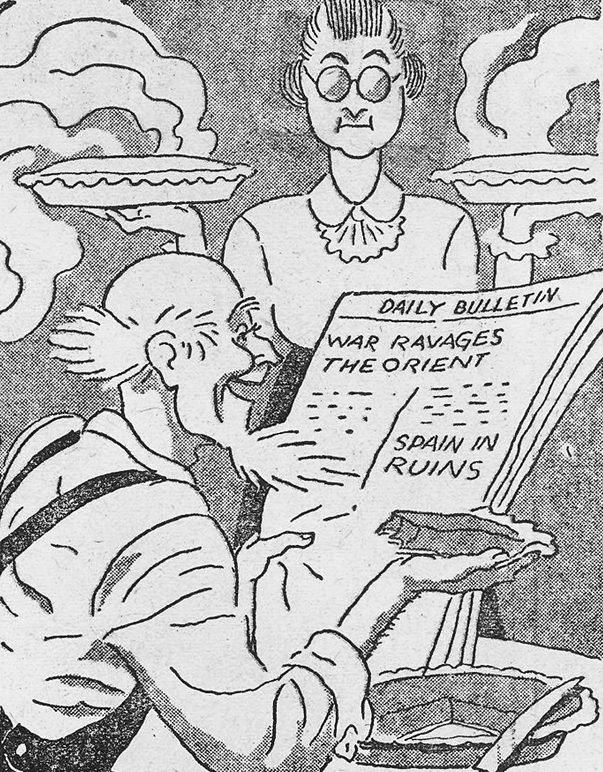In his play, Boston Marriage, David Mamet has one of his characters say: “We must have a pie. Stress cannot exist in the presence of pie.” And Yogi Berra supposedly once said: “Cut my pie into four pieces, I don’t think I could eat eight.”
There are many, many pumpkin pies bought or made from scratch and served at American tables around this time of year. Several writers have praised these traditional desserts and the Lazy Farmer did so in the Sept. 24, 1938, issue of the Michigan Farmer.
At the time, the Chinese and Japanese were engaged in fighting on the Chinese mainland, while the Spanish Revolution that brought Francisco Franco to power, with the help of Hitler and Mussolini, was in full swing, hence his references to these conflicts.
“Along about this time in fall I can’t think ‘bout a thing at all but punkin pie, it seems to me the world is safe as long as we keep on a-raisin’, year by year, a punkin crop; there ain’t no fear of revolution bye and bye if folks is filled with punkin pie.
“A piece of pie that’s oven-hot will soothe your spirit, like as not; it fills your soul with love and peace, the smell alone will make you cease from talkin’ politics or war.
“There ain’t no room for trouble, for when you’ve filled up on punkin pie you understand the reason why a man can love his enemies, there ain’t no room for hate, gee whiz, in our insides, if we but dine on punkin pie, so brown and fine.

“There ain’t no punkins in Japan, and if we want to work and plan to bring peace to the Orient, we sure could do it if we went and loaded up a ship and took a lot of punkins and a cook.
“For when they smelled them punkin pies, them soldiers all would surely rise and leave the trenches and the gore while passin’ up their plates for more of that there pie, they couldn’t fight because their belts would be too tight.
“The Spaniards too would cease their row and sign a treaty up somehow if mellowed up with punkin pie, they wouldn’t want to fight and die.
“They’d leave the army flat for fear, when pie time comes around next year, they’d not be here to git a piece, and so the fightin’ all would cease; good-will and peace should shroud the earth that gave the punkin fruit its birth!”
* * *
Another story of punkin pie is in the 1913 book Bascom Clarke, the Story of a Southern Refugee by Charles E. Whelan. Based upon an actual event, the dialog is fictitious and may or may not have really occurred.
The story is about Bascom Clarke, who later became editor of the American Thresherman, as a young orphan from Rebel Arkansas who is being relocated to Indiana in the heart of the Yankee north during the Civil War.
On the steamboat trip up the Mississippi and Ohio rivers to Indiana, a Hoosier soldier who is going home befriends the frightened boy and tells him all about his destination.
Here’s part of it: “I don’t believe yuh ever eat a punkin pie in yer life, did yer? No, I thought not. Nobody never eat no punkin pie unless ‘twas in Indiana.
“Oh, they have imitations other places, but there’s as much difference between a Indiana punkin pie and what they call punkin pie other places, as there is atween a slipp’ry elm poultice and a mustard plaster.
“Fer a bruise that needs suthin’ coolin’ and soothin’, a slipp’ry elm poultice is jest the thing. It’ll make you forget you ever had a ache er a pain, and you’ll drop off to sleep like a nussin’ baby.
“But when yer in a terrible state they’ll slap a mustard plaster on ye, and the dern thing’ll begin to burn and blister and you’ll beg ‘em to take it off, but they’ll leave it on till it hurts worse ‘n the original ache, and then you’re supposed to be cured.
“An Indiana punkin pie’ll slide gently down, feeling good all the way, then it’ll softly nestle itself in the cozy corner o’ yer stummick and telegraph back to yer brain to quit worryin’, everythin’s all right; then it’ll hum ‘Home, Sweet Home,’ and you’ll go to sleep and dream of angels fannin’ yuh softly with their wings and smoothin’ yer hair back from yer for’ead like mother used to do.
“And you’ll wake up a new man. But you got to be ‘tarnal hungry to eat the other kind. If you do, you’ll wish you hadn’t, and you’ll feel so punk you’ll forget you’re hungry.”
* * *
I like pumpkin pie, except for the bland kind some folks make with hardly any spices in it, but I guess I never felt quite as passionate about it as these two.
Give me berry or mince – or cherry, or maybe Dutch apple or peanut butter cream. Just about any kind of pie is good, so long as the crust is light and flakey – no cardboard, please.
And I can attest to the Hoosier soldier’s hatred of mustard plasters. When I was a kid, these instruments of torture were my mother’s go to cures for a chest cold and I’ve been burned and blistered by many of the blasted things, until I tearfully begged for relief only to have my pleas ignored.
Of course I now realize that, although she was misguided, Mom was only trying to help me get better and undoubtedly felt bad about what she was putting me through.












